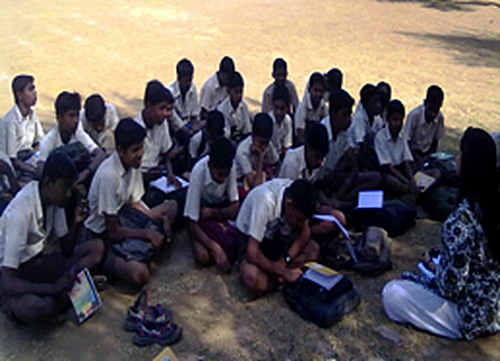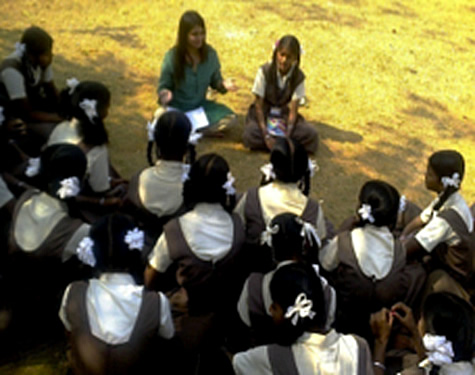Teaching Internship in Maharashtra, India
Story and photos by Shruti Manian
 |
| Teaching boys outside of their classroom in India. |
A Journey to Rural India Begins With Two Trains, a Bus, a Rickshaw and a Motorcycle
When I came back to Mumbai to spend the summer at home after my sophomore year in college, I knew I wanted to do something productive with the three months that stretched out in front of me. After much research, I finally found an internship with an environmental organization called Vanahakti, based in Mumbai. Vanashakti literally means "power of the forests."
My initial job was to help Vanashakti’s team with legal research for the environment related Public Interest Litigations that they would be filing with various Mumbai courts. In my first week at work, I learned that Vanashakti also ran a number of education and employment initiatives in a rural part of the state called Wada, located around five hours away from Mumbai. The staff at Vanashakti reached out to interested rural schools in Wada and offered weekly Environmental Education Classes to their students.
Getting There: Public Transport at the Crack of Dawn
My supervisors decided that I could go to Wada and assist in a classroom. However, many adventures awaited me before I even reached Wada. Kavita, my supervisor from Vanashakti informed me that we would begin teaching class at around 11:00 a.m. In order to get to Wada by 11:00 a.m. we had to leave Mumbai at dawn. Therefore, before dawn on a Thursday morning, I found myself waiting for a train on a deserted railway platform. Two train changes later, I met up with Kavita on the outskirts of Mumbai. A quick rickshaw ride later, we found ourselves at a bus stop. However, to my utter horror, the bus that would take us to Wada was full. People were packed on the seats, standing in the aisles. I assumed we would just wait for next bus and hope that it would be slightly less packed. When I voiced this thought to Kavita, she just gave me an amused look and ushered me into the bus. Apparently, the bus only made the excursion twice a day, once in the morning and once in the evening. As I stood in the crowded bus, I realized how out of touch I was from the reality of rural India. Cosseted in my little urban bubble, I barely realized the difference that existed a mere four hours away from where I lived.
At the end of our bus ride we had one final hurdle to cross before we got to Wada. At the bus stop, a young man who assisted Vanashakti with odd jobs in the village was waiting to pick us up. Every week he and Kavita went to the village on his motorbike. This was a fine arrangement when there were just two people. However, a third made this arrangement slightly trickier. As it turned out the only vehicles that could traverse the village’s dirt roads were motorbikes or bullock carts. When informed that my only other alternative would be to wait for a bullock cart to come pick me up, I hurriedly agreed to sit on the motorbike with Kavita and the young man from the village.
As someone who has lived her entire life in Mumbai, I am not very familiar with rural India. I find myself more at home amidst urban sprawl and highways packed with traffic than in the midst of rolling fields and dirt roads. Therefore, the long ride with two other people, on a motor bike, through dirt roads was almost the last straw for me. It was barely 10:00 a.m. and I had already been awake for six hours and taken almost every mode of transport known to humankind. I was exhausted, hungry, and grumpy to say the least.
First Impressions
When we reached Wada, Kavita led me to a little hut in the village, where a woman she knew cooked for her every time she stayed at the village. Except for the morning sunlight that filtered through the windows, the room had no electric lights. However, the lack of modern electricity seemed to have had no influence whatsoever on the food that was served. As I devoured rotis (flat, Indian bread) with some delicious vegetables, I felt my energy returning. I realized that even though the house was not up to modern standards, it was cleverly built. Despite the lack of a fan and the intense heat of an Indian summer, the inside of the hut was cool and comfortable.
We walked to the school building, which was a small single story building that bustled with noise and activity. As Kavita and I walked into an 8th grade classroom, I suddenly felt nervous. How was I supposed to help teach a classroom full of students something that I did not know too much about? Swallowing my fears, I decided I would just follow Kavita’s lead and it would not be too hard. However when I saw the classroom with its flickering electricity and cramped benches, things did not look very promising.
My first thought when I saw the 40 students in the classroom was that they looked very young for 13-year-olds. However once I got past my own, flawed first impressions, I really saw the classrooms and the students sitting on those crowded benches. The walls were covered with colorful charts made by the students. The children drew maps, animals, old Indian kings and much more. With these simple pieces of paper, pens and some tape, these students had livened up an old classroom and made it their own. The cracked classroom walls and failing electricity were no indicators of the brightness of the students that inhabited it. The class had an almost even gender split, which in rural India is a very encouraging sign.
 |
| Teaching girls outside of their classroom. |
Kavita taught the students about waste disposal and management systems around their village and in the state. We did all our teaching in Hindi and the local language of Marathi. As the class progressed, my confidence in my rusty Marathi skills grew. Since we had complete freedom in what we chose to teach we spent most of the class outdoors. The children listed the trees, plants, and insects we saw around the village and we helped classify them into scientific categories. We also discussed endangerment and extinction of species. Instead of reading textbooks about oil spills in far off oceans or dams being built across the country, these students walked out into their backyards and learnt the value of the creatures they shared their homes.
Reflections
While I can easily rattle off answers to questions about environmental laws and preach the importance of mangroves to coastal ecosystems at length, it is the plethora of unanswerable questions that my short internship raised that sum up my learning experience. I find myself struggling to find words to describe the lives that people in rural India experience. With every re-read of this account, I worry that I may have written something — a phrase, a sentence, that reeks of urban privilege. However, for better or worse, that is exactly what I am: a privileged, urban kid.
If living in India has taught me one thing, it is that poverty is not to be celebrated. Living in houses with sloping roofs, and cooking food (no matter how delicious) in chulhas is not romantically rustic. Being poor is extremely hard, especially in a country like India where a large part of the population is taking enormous strides forward. People who are poor and lack opportunities are often left behind. What my internship taught me was that there is a very fine balance between acknowledging the hardships that many people in rural India face and not coming off as self-righteous or condescending.
Perhaps the people in these villages do not need our pity after all. What these people need is access to the opportunities that they rightly deserve. They deserve to have Environmental Education classes. They deserve electricity in their classrooms, and they deserve to keep their dignity and not be the cynosure of national or international pity. I think I have learnt that people in rural India do not need my sympathy or my "help." They simply need what our country owes them and every other Indian — the opportunity to succeed.
Shruti Manian is a student at Vassar College. She grew up in Mumbai and worked as an intern with LearningService.info through the Washington Semester program at American University.
|
